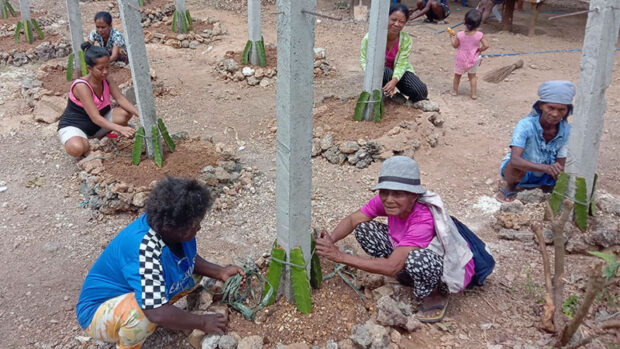
KEEPING IT PRODUCTIVE | Members of the Ati tribe on Boracay Island try to grow dragon fruit on the land awarded to them by former President Rodrigo Duterte in 2018, in this photo taken on March 20. The land is now the subject of a legal battle between them and property developers. (Photo courtesy of Kchyrziashayne Dyñelle Dinopol)
ILOILO CITY, Iloilo, Philippines — The Ati tribe and other indigenous peoples (IP) settlers of Boracay Island are in danger of losing parcels of land awarded to them during the Duterte administration, amid claims these were unsuitable for agricultural production.
In four separate but related resolutions that had been issued since March, the Department of Agrarian Reform in Western Visayas (DAR) granted the protest petition filed by property developers over some 4,800 square meters of land awarded to about 15 Ati tribal families as land reform beneficiaries in Barangay Manoc-Manoc of the 1,032-hectare island.
Shiela Enciso, DAR regional director, gave credence to the claim of property developers that the 4,800-sq m land covered by the Certificate of Land Ownership Awards (Cloas) granted to the Ati families was no longer suitable for farming.
With the protests having been acknowledged, the DAR resolution directed the protesters to file for a cancellation of the Cloas, which, if approved, would allow the property developers to acquire the lands.
But the lawyers of IP groups in Boracay were poised to fight the revocation of the Cloas, saying the decision of DAR would affect up to 15 Ati families who relied on these properties for their sustenance.
These Cloas, or the proofs of ownership as agrarian reform beneficiary under Republic Act No. 6657, (Comprehensive Agrarian Reform Law of 1988), were issued to members of the Boracay Ati Tribal Organization (Bato) and the Boracay Tumandok Agrarian Reform Beneficiaries Association by then President Rodrigo Duterte in 2018.
Duterte awarded a collective Cloa covering 3.2 ha to 44 Ati families and 16 ha to non-Ati families.
Soil test result
The lands covered by the Cloas are separate from the 2.1-ha beachfront property in Manoc-Manoc that is covered by a Certificate of Ancestral Domain Title issued by the government in 2011, through the National Commission on Indigenous Peoples, that was granted to the whole Ati community on the island. The Ati tribe is considered the earliest settlers on the island before it became a world famous tourism destination.
The distribution of lands through agrarian reform was part of the much-touted cleanup on Boracay in 2018 after Duterte called the island a “cesspool” due to the environmental degradation.
But last March, Enciso’s office accepted the protest of Digna Elizabeth Ventura, president of Anchor Land Holdings, over the issuance of Cloa for a 1,200-sq m property in Manoc-Manoc.
Later, Enciso also approved a similar protest filed by Bohol Regal Inc. and Jeco Development Corp. on two separate properties covering 1,200 sq m each in the same area on April 26; and that of Y Investments Philippines Inc. on May 3.
The protests claimed that the four parcels of land were unsuitable for farming, and therefore outside of the “Network of Protected Areas for Agriculture,” based on the results of the soil tests done by the Bureau of Soils and Water Management (BSWM) and a similar report by the Agricultural Land Management and Evaluation Division, which are both agencies attached to the Department of Agriculture.
Instead, the properties were “highly recommended” by both agencies as eco-tourism zone and “medium-density tourist commercial” areas.
Tillable lands
Lawyers Daniel Dinopol and Kchyrziahshayne Dyñelle Dinopol, the father-daughter counsels for Bato, refuted the property developers’ claim, saying the Ati families had long been farming and raising livestock on the lands awarded to them, which means these properties fall under the agricultural land category.
They said they had filed before DAR-6 a motion for recommendation on Ventura’s protest and would file similar motions on the three other protests.
“The [Ati tribe members] have been making the land productive, planting papaya, avocados, coconuts, and lemongrass. In fact, one of the hotels in Boracay Island has been getting lemongrass from them. They also have sweet potatoes, chili peppers, and calamansi. They are also raising range chickens and ducks,” said Daniel Dinopol.
He also questioned BSWM’s findings, as the bureau’s mandate was not to determine a soil’s suitability for agricultural purposes but to determine the composition and minerals of the soil as well as advise the DAR and the farmers on what crops are best suited for that land.
Geony Licera-Gregorio, DAR legal division chief in the region, assured that the use of land for agricultural purposes by the tribe’s members would be revisited by the agency as part of the motion for reconsideration.